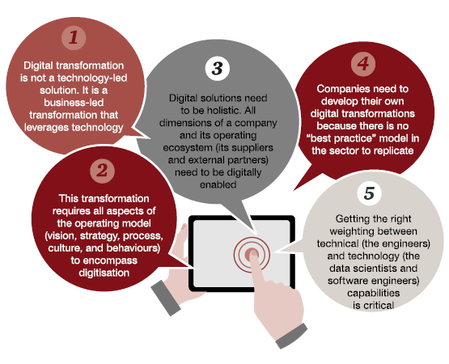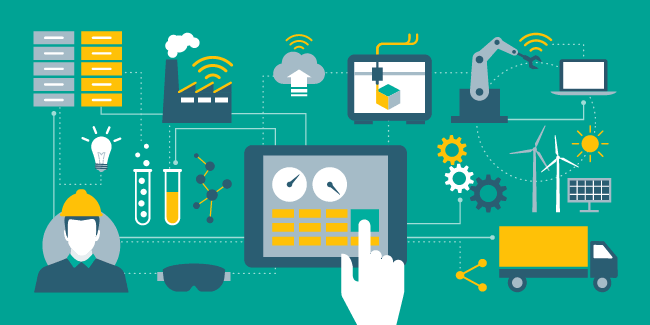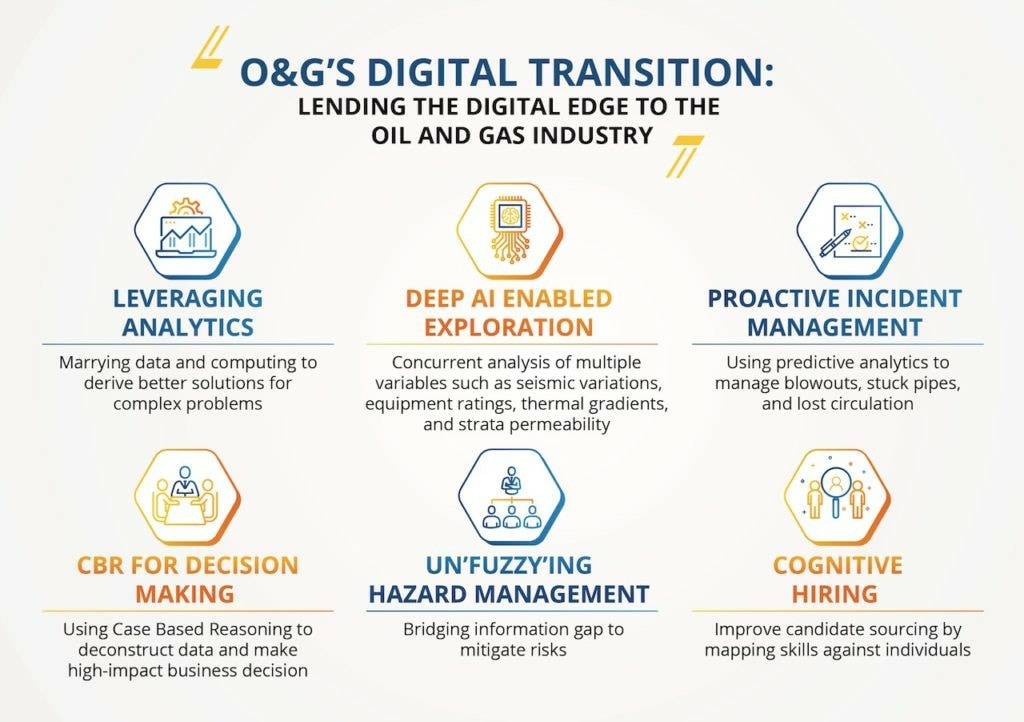“A century ago, petroleum – what we call oil – was just an obscure commodity; today it is almost as vital to human existence as water.” – James Buchan
Digital technology is used to draw new boundaries and drive productivity in businesses all around the world. The implications of these changes and the advancement of technology can lead to a disruptive trend and hence it is important to adapt and evolve with the new ideas to stay ahead of the curve in the market.
The oil and gas sector has been on the forefront of several technological advancements like:
- Supercomputing techniques for reservoir modelling
- Seismic imaging for drilling and planning
- 3D imaging for drilling and project development
- Accurate forecasting
- Enhanced oil recovery
- Predictive maintenance
Source: https://www.ogj.com/na/ifs/digital-transformation-and-og.html
- The depth a company can reach, while drilling, is deeper than ever and was earlier impossible to even consider, due to safety constraints.
- Tasks get completed in less than half the time it used to take earlier.
In order to look at a full digital transformation for the oil and gas industry, a company would need to look at soft and hard automation technologies. Agile ways of working need to be adopted to transform operations and create a new business model which incorporate the use of latest digital technologies and sufficient manpower training to ensure a smooth transformation process.
New emerging technologies provide significant opportunities to evolve various aspects of the business operations, core processes and the overall business model to maximize profits. These technologies often require significant investments, however in order to be an industry leader, the organization would need to look into these costs and weigh them against the far greater benefits.
Let us have a look at how a streamlined and digitally abled operation, benefit from adopting the change as opposed to their counterparts:
Health, Safety and Environmental Performance
Advanced analytics help ensure a high safety record and also identify rick factors based on operational choices made. Robotics will soon replace humans in hazardous environments, thus ensuring an increase in wellbeing of significant and skilled manpower.
Better Planning
Big data or Smart data platforms help in improving subsurface planning as it provides necessary data about the terrain and how best to proceed with oil mining. This also significantly helps lower the costs and leads to better productivity.
Automation
Digital technology helps reducing the numerous interfaces and handovers, among other backend tasks. Some operations from the designing to the execution stage can take weeks or months, but digital data can help reduce that time and even predict outcomes before the project commences.
Off-shore Operations
Using advanced language processing makes the functioning and performance of an off-shore operation a lot smoother. Moving off-shore operations back would also be beneficial provided other factors match up. In the United States alone, about 65 percent of producing oil wells are marginal oil wells, producing less than 10 barrels per day (bpd) of oil.
Source: https://www2.deloitte.com/insights/us/en/industry/oil-and-gas/digital-transformation-upstream-oil-and-gas.html
More Efficient and Lower Supply Cost
Digital logistics planning makes it possible for faster deliveries without errors in consignment and there is also reduced documentation and better monitoring. Additionally, the reduced costs help with more funds for research and development and creating new business models for the changing markets.
Digital ways of working go above and beyond the mere functioning and operations of teams and systems. There is better use of cross-functional teams and knowledge which lead to quicker and more favourable results. Let us look at a few key trends which are helping the oil and gas industry flourish:
Agile Way of Working
Despite a certain degree of centralization, an agile approach is most favourable to help establish control centres which look into remote operations while making the most of the digital revolution. This also ensures the need for lesser teams and a smooth transition period.
Automated Core Processes
Machines were invented to make life simple and the same applies for technology today. Process automation leads to a reduction in manual costing. This also means skilled labour can be utilized for more supervisory, intricate and sensitive matters. This means work gets done with greater speed and accuracy like in the logistics and planning department.
New Talent Profiles
With the automation of tedious tasks, new talent capabilities can be tapped. Agile coaching, data science and advanced technology are courses which will help trained and skilled employees excel while evolving and helping the organization increase its profits.
Endorsing Standardization While Maintaining a Competitive Edge
Bringing together suppliers, partners, and technology providers to develop open platform solutions in areas with high value creation potential and minimal competitive edge is also something to look forward to in the coming years.
How Digital Have You Become Today?
“The oil and natural gas industry is a key driving force in the Canadian economy, accounting for 7% of Canada’s gross domestic product and employing upwards of 500,000 countrywide…Thanks to cost leadership and adoption of emerging technologies, U.S. manufacturers hold a significant advantage over competing regions.”
Source: https://www.export.gov/article?id=Canada-Oil-and-Gas
Despite the digital advancements, oil and gas companies have been reluctant to seize the opportunity. The benefits of going digital are clear, yet companies are unsure of the costs and major modifications required to their systems.
Typically digital thinking and narratives stop at data analysis and insights provided, however to become a digital leader the company needs to make a change in its core processes by modernizing its assets. A roadmap would make it easier for you and if you would like to discuss the same, you can contact our App Scoop mobile app developers Vancouver team on: https://app-scoop.com/contact-us.html.






